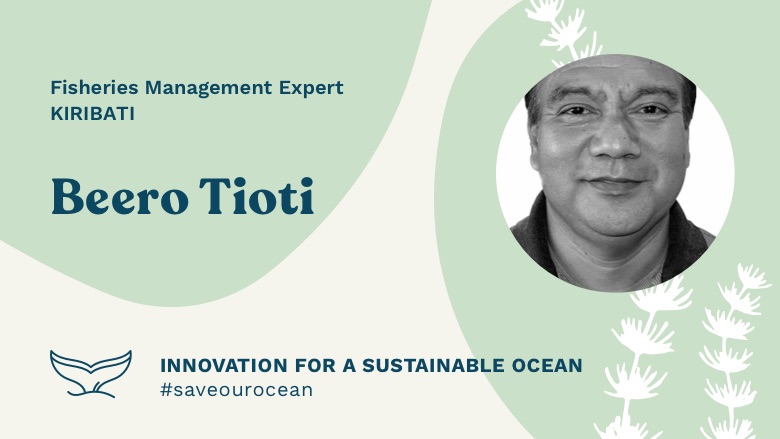Tell us about yourself.
I was born in Kiribati but I spent most of my young life in Fiji. I then came back to Kiribati to complete senior high school. I did a Bachelor of Biological Sciences degree at the University of Papua New Guinea, and I did my post graduate degree in Aquaculture at James Cook University in Townsville, Australia.
I started my career with Kiribati Fisheries in 1994 as a fisheries biologist. Fisheries is the main kind of field that you can get into in Kiribati. In Kiribati we rely on the ocean; it is the major employment sector in the country. We don't really have much land, so our lives are based around our fisheries.
How does your work help to promote and maintain ocean health?
I've been working for the Kiribati Ministry of Fisheries and Marine Resources Development for over 15 years. About a year ago I began working on the Kiribati component of the Pacific Islands Regional Oceanscape Program, a World Bank funded project. The project works to strengthen the monitoring, control and surveillance of large-scale offshore fisheries, diversify revenue streams for outer island coastal fishing communities, and improve seafood safety measures. The World Bank’s support to fisheries in Kiribati is complemented by partners, including New Zealand’s Ministry of Foreign Affairs and Trade.
Kiribati is home to the most productive Exclusive Economic Zone (EEZ) in the Western Central Pacific Ocean. Of the fishing nations in the Pacific, we have the highest volume of catch, contributing 28.4 percent to the regional total in 2016. So it’s really important that foreign fishing vessels observe the fisheries regulations in our EEZ.
We are using satellite-linked vessel monitoring systems and national observers to detect what happens on board the big fishing vessels. With the latest technology and trainings, we hope that we are able to monitor and report better on fishing activities, including illegal activities such as waste disposal at sea. We need the benefits from the fisheries, but we need to sustain our oceans as well. The benefits are not just for us, but for those in the future.
What do you see as the biggest challenges facing our oceans in 2020?
Illegal, unregulated and unreported fishing is one of our main challenges, and marine pollution associated with fishing and shipping activities. Given that these big fishing fleets are out there on the vast ocean, it can be hard to monitor what they do.
What does this year’s World Oceans Day theme, ‘Innovation for a Sustainable Ocean’, mean to you?
The program aims to secure our ocean economy through monitoring but also by finding sustainable revenue streams for outer island fishing communities. We are trying to improve livelihoods of coastal communities, but at the same time motivate them to look after their coastal resources and environment.
So the program is innovative in that it looks at large-scale commercial fishing, the livelihoods of local coastal communities and the health of the marine environment all together – we aren’t just looking at one aspect of the ocean on its own.
I do think that we need to be more creative in finding ways of sustaining the health of the oceans and the resources within, so our children, and their children, will continue to enjoy the benefits that we derive from the oceans today.
What message would you like everyone to hear on World Oceans Day 2020?
My message would be that as custodians I think we really need to look out for, and take care of, the ocean. For a better today, and a better tomorrow as well. I wish that I could change people's attitudes to not only see the ocean as a place to derive wealth from, but also as a place that needs to be looked after.

